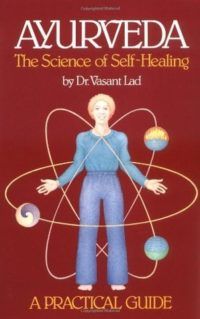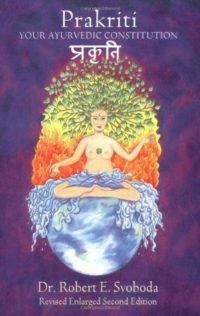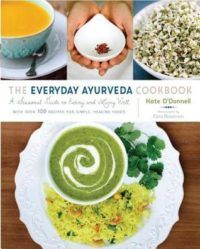Here are four resources that have helped me along the way.
Ayurveda by Sahara Rose Ketabi
This overview of Ayurveda, the science of life, has a foreword by Deepak Chopra, the guru for all things mindful. While listed as an idiot’s guide (not a fan of the monicker), it does break down the ancient science in very simple terms. Before giving any kind of advice, the book offers an in-depth history of Ayurveda and how it can be incorporated into Western culture. It also touches upon yoga (the sister science!). In addition to advice and benefits, there’s also a section that shows how we may be living Ayurvedically without knowing it. Then there’s another section that dispels typical myths and reasons Ayurveda seems hard when it’s really not. After all of that, you get to take a fun quiz to discover your dosha! Everyone has a dosha—it’s your natural inclinations towards food, behaviors, and energies. After this discovery, the book offers advice for living according to your dosha.
Ayurveda: The Science of Self Healing: A Practical Guide by Vasant Dattatray Lad
Much like the aforementioned guide, this guide also offers a history of Ayurveda along with all kinds of philosophy at the root of this science. It also includes a section on the doshas along with another section about disease and diagnosis. Because it focuses on self-healing, it lists home remedies in the form of herbs, spices, and foods and also through activity, exercise (including yoga, the sister science!), and rest. Ooh, rest! This book is also filled with helpful charts and graphs to more clearly explain how all this information can work for you.
Prakriti: Your Ayurvedic Constitution by Robert E. Svoboda
This resource doesn’t offer a long history of Ayurveda as the guides above do, though it does include a bit of an overview in the foreword. It jumps right into explaining the doshas and tastes. Then it explains how to discover your own essential nature, also called prakriti; it’s the balance of your doshas and senses and tastes. After figuring that out, you can learn about food, daily routines, and rejuvenation. Interestingly, there’s a section entitled Beyond Ayurveda that discusses immortality. It also discusses Kundalini yoga, but that immortality bit kind of catches everyone’s attention.
The Everyday Ayurveda Cookbook: A Seasonal Guide to Eating and Living Well (Over 100 Recipes for Simple, Healing Foods) by Kate O’Donnel, Photographs by Cara Brostrom
While a lot of people diet, Ayurveda is all about the food. Lifestyle and food go hand in hand. This book offers recipe ideas to balance the three energies of the mind: sattva, rajas, and tamas. Explanations are available in the book, of course.
What to Eat for How You Feel: The New Ayurvedic Kitchen—100 Seasonal Recipes by Divya Alter
Once you’ve exhausted all the recipes in the aforementioned cookbook, move onto 100 more here. This book includes a list for kitchen staples (like ghee, always have ghee) and non-dairy alternative suggestions. These recipes are based on Alter’s many years of vegetarian catering and teaching, so they’ve got to be good. Changing a lifestyle is overwhelming; these resources help break down all the components of Ayurveda so we can pick and choose what we tweak and what we keep. These books are also helpful in offering a refresher for anyone who has already gotten into Ayurvedic habits. Want even more recipe ideas? Of course we do because it’s all about the food. Find more Ayurvedic suggestions here, then learn more about its sister science yoga.




